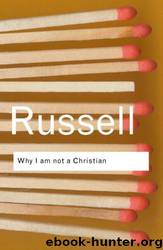Why I Am Not a Christian and Other Essays by Bertrand Russell

Author:Bertrand Russell [Russell, Bertrand]
Language: eng
Format: epub
Tags: Religion, History & Surveys, Philosophy, Agnosticism, Modern
ISBN: 9780671203238
Google: Kii2ngEACAAJ
Amazon: 0671203231
Barnesnoble: 0671203231
Goodreads: 472025
Publisher: Read Books
Published: 1927-01-01T05:00:00+00:00
Well, why does one type of object look yellow and
another blue? I can more or less give an answer to that thanks to the physicists, and as to why I think one sort of thing good and another evil, probably there is an answer of the same sort, but it hasn’t been gone into in the same way and I couldn’t give it you.
copleston:
Well, let’s take the behaviour of the Commandant
of Belsen. That appears to you as undesirable and evil and to me too. To Adolf Hitler we suppose it appeared as something good and desirable. I suppose you’d have to admit that for Hitler it was good and for you it is evil.
russell:
No, I shouldn’t quite go so far as that. I mean, I think people can make mistakes in that as they can in other things.
If you have jaundice you see things yellow that are not yellow.
You’re making a mistake.
copleston:
Yes, one can make mistakes, but can you make a
mistake if it’s simply a question of reference to a feeling or emotion? Surely Hitler would be the only possible judge of what appealed to his emotions.
russell:
It would be quite right to say that it appealed to his
emotions, but you can say various things about that, among others that if that sort of thing makes that sort of appeal to Hitler’s emotions, then Hitler makes quite a different appeal to my emotions.
copleston:
Granted. But there’s no objective criterion outside
feeling then for condemning the conduct of the Commandant of Belsen, in your view?
t h e e x i s t e n c e o f g o d
145
russell:
No more than there is for the colour-blind person
who’s in exactly the same state. Why do we intellectually condemn the colour-blind man? Isn’t it because he’s in the minority?
copleston:
I would say because he is lacking in a thing which
normally belongs to human nature.
russell:
Yes, but if he were in the majority, we shouldn’t say
that.
copleston:
Then you’d say that there’s no criterion outside
feeling that will enable one to distinguish between the behaviour of the Commandant of Belsen and the behaviour, say, of Sir Stafford Cripps or the Archbishop of Canterbury.
russell:
The feeling is a little too simplified. You’ve got to take account of the effects of actions and your feelings towards those effects. You see, you can have an argument about it if you say that certain sorts of occurrences are the sort you like and certain others the sort you don’t like. Then you have to take account of the effects of actions. You can very well say that the effects of the actions of the Commandant of Belsen were painful and unpleasant.
copleston:
They certainly were, I agree, very painful and
unpleasant to all the people in the camp.
russell:
Yes, but not only to the people in the camp, but to
outsiders contemplating them also.
copleston:
Yes, quite true in imagination. But that’s my point.
I don’t approve of them, and I know you don’t approve of them, but I don’t see what ground you have for not approving of them, because after all, to the Commandant of Belsen himself, they’re pleasant, those actions.
Download
This site does not store any files on its server. We only index and link to content provided by other sites. Please contact the content providers to delete copyright contents if any and email us, we'll remove relevant links or contents immediately.
| Anthropology | Archaeology |
| Philosophy | Politics & Government |
| Social Sciences | Sociology |
| Women's Studies |
The remains of the day by Kazuo Ishiguro(7552)
Tools of Titans by Timothy Ferriss(6950)
The Black Swan by Nassim Nicholas Taleb(6192)
Inner Engineering: A Yogi's Guide to Joy by Sadhguru(5897)
Giovanni's Room by James Baldwin(5880)
The Way of Zen by Alan W. Watts(5800)
The Six Wives Of Henry VIII (WOMEN IN HISTORY) by Fraser Antonia(4791)
The Power of Now: A Guide to Spiritual Enlightenment by Eckhart Tolle(4756)
Astrophysics for People in a Hurry by Neil DeGrasse Tyson(4620)
Asking the Right Questions: A Guide to Critical Thinking by M. Neil Browne & Stuart M. Keeley(4576)
12 Rules for Life by Jordan B. Peterson(3734)
The Ethical Slut by Janet W. Hardy(3504)
Skin in the Game by Nassim Nicholas Taleb(3462)
Housekeeping by Marilynne Robinson(3402)
The Art of Happiness by The Dalai Lama(3385)
Double Down (Diary of a Wimpy Kid Book 11) by Jeff Kinney(3276)
Skin in the Game: Hidden Asymmetries in Daily Life by Nassim Nicholas Taleb(3264)
Walking by Henry David Thoreau(3235)
12 Rules for Life: An Antidote to Chaos by Jordan B. Peterson(3204)
